
Abstract: One way to disrupt traditional Eurocentric teaching practices is through modifying curriculum in classes. Particularly, in an English Composition 101 course, an ongoing assignment called the Poetry Journal may assist students in thinking critically and reflexively. The concept was inspired by a high school English teacher, Brett Vogelsinger (2016), called “4 Reasons to Start Class with a Poem Each Day.” His four reasons: 1. Poems are short; 2. Poems are intense; 3. Poems connect (to other readings); 4. Poems inspire (writing). When building the assignment for a community college class, an instructor may make intentional (disruptive) choices for the poems. This article explores the project, which is grounded in culturally sustaining (Paris, 2021) and disruptive pedagogies (San Pedro, 2018)—both of which encourage the rethinking and dismantling of traditional Eurocentric-based instruction—and how the author (full-time faculty at a community college) applied said pedagogies to a specific in-class student activity to engage students in critical and reflexive thinking.
Continue ReadingThis editorial overview provides an introduction to this special Journal of Sustainability (JSE) issue devoted to water and climate change, which is being released during United Nations World Water Day 2020. The article contextualizes some of the water security risks that are exacerbated by climate change, such as increasing floods and droughts. This piece further provides a brief overview of the articles in the special water and climate issue of the JSE.
Continue Reading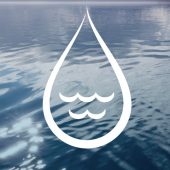
Journal of Sustainability Education senior editor Amanda Bielawski sits down with Megan Schufreider, director of education for the California Academy of Sciences to discuss how climate change is creating more demand for water-related curricular resources, with a specific emphasis on the importance of teaching about virtual water footprints. The Q&A interview concludes with a list of water-related curricular resources, including various water footprint calculators, available to both educators and the public.
Continue Reading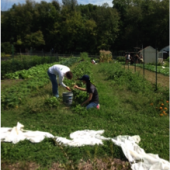
Abstract: Campus agriculture projects are increasingly being recognized as spaces impactful to student engagement and learning through curricular and co-curricular programming; however, most campus farm activities are limited to agriculture or sustainability programs and/or co-curricular student clubs. Thus, campus farms are largely underutilized in the undergraduate curriculum, marking a need to explore the efficacy and impact of engaging a diverse array of disciplinary courses in the rich social, environmental, and civic context of local sustainable agriculture. The Farm Hub program presented here incentivizes instructors to refocus a portion of existing course content around the topic of local, sustainable agriculture, and reduces barriers to using a campus farm as a situated learning context for curricula. A pedagogical framework founded in place-based experiential learning (PBEL) theory was developed to guide instructors in the development and implementation of 4–6-week inquiry-based PBEL modules embedded in existing courses. The framework was converted into a research protocol to quantify program implementation fidelity and PBEL best practice adherence for the proposed lesson plans (intended) and their implementation (applied). The framework enables the development of a cohesive cross-curricular program so that the impact of implementation fidelity and best practice adherence to student learning outcomes in scientific literacy, place attachment and meaning, and civic mindedness can be assessed and the results utilized to develop a formal farm-situated PBEL pedagogical taxonomy. This framework can be applied to PBEL curriculum in natural spaces beyond campus farms.
Continue Reading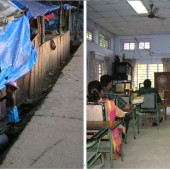
Among all the pressing needs for educational innovations that we face today, arguably the most imperative is the need to elicit learners’ active collaboration towards a ‘Great Transition’ into a secure and sustainable future for humanity. Among the numerous challenges that this endeavour entails, the anticipated arrival of unprecedented numbers of climate refugees will severely challenge the capacities of host institutions to maintain human security – connecting to a second pressing need, namely to promote and maintain cultural safety for newcomers and hosts. We focus on the question how compatible those two educational projects might be. To what extent could a Transition curriculum include and inform a curriculum for cultural safety, and how could a curriculum devoted to the principles of decolonisation internalise the need for living within our means? Neither one can be successful without the other. In general the two educational projects are reconcilable and inform and reinforce each other. However, some specific objectives of the Transition curriculum, mainly in the affective domain, require careful attention to cultural differences and reasoned compromise.
Continue ReadingSince a curriculum represents a selection of socially constructed knowledge, it should be interpreted as a stake-holder in an ideological process. It is a political issue whose forms depend, among other things, on the degree to which education systems are centralized. Today, supranational bodies can influence the curriculum, particularly within the framework of UNESCO’s implementation of the decade of Education for Sustainable Development (ESD). Consequently, examining the curricula associated with the emergence of ESD involves examining the politics underlying them, politics which are not always explicitly stated – hence the interest in the concept of a hidden curriculum. The purpose of this study is to analyze the ESD curriculum in France. To this end, we use a methodology that considers the main work conducted about ESD in the framework of French research programs and based on the concept of hidden curriculum. This requires performing a diachronic analysis of changes in curriculum choices and forms of schooling, and identifying the value system underlying those changes. We identify several of the main characteristics of those changes, including in terms of project dynamics, partnership, transdisciplinarity, the role of knowledge, the distance from practice, and the persistence of a western conception of development. We then situate the French specificities within the international context.
Continue ReadingIn 1999, the National Association of Social Workers (NASW) in the United States published a policy statement on the environment that acknowledged the social work profession’s apparent “lack of interest” in environmental issues, and called for a new urgency among social workers to address the challenges of pollution, environmental contamination, and resource depletion. Despite this call for urgency and the increasing certainty of widespread social and environmental crises due to climate change, the integration of ecological concepts into mainstream social work education and practice has been slow and sporadic. Only recently have some social workers begun to openly discuss a re-centering of social work within a sustainability paradigm, emphasizing the importance of interconnectedness among humans and the natural world, interdisciplinary alliances and partnerships, and holistic justice-focused practice. This paper explores the potential for a case study assignment in a Master of Social Work (MSW) program to help make explicit connections between sustainability concepts introduced in the classroom and the practical application of these concepts in a wide range of social work practice settings. Three sample case studies from students are presented, and advantages and challenges of this pedagogical approach are discussed.
Continue Reading
Abstract: The author has written extensively about American Indian relationships to the natural world with a focus on his published concepts of kincentricity and kincentric ecology (Salmon, 2000). Both are explanatory models of how American Indian cultures feel a sense of direct relationship and responsibility toward their surroundings. Traditional American Indians understand that they are directly related to everyone and everything in their natural surroundings. Everything in one’s environment is animated with a life force. How then does one teach kincentric ecology in an urban environment? A suggestion is to assign projects that will help students recognize the relationships happening all around them and to recognize that we humans exist in a relationship with everything around us. The author devised a project asking students to make periodic observations of the sun and/or moon. In the process of their observations students were asked to become aware of and to journal about their surroundings during their observations. The result was that students became periodically immersed in their natural surroundings and were, therefore, exposed to a facet of kincentricity.
Continue Reading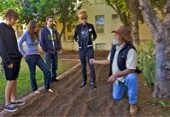
Abstract: Since Michael Crow, President of Arizona State University, founded the School of Sustainability in 2006, sustainability has become a central focus at the University. ASU offers both undergraduate and graduate degrees in sustainability, from Bachelor’s degree to Ph.D. level. The author, the Dean of the School of Sustainability at ASU, discusses how the University’s programs foster hope and agency among students and prepare them to address the pressing challenges of living and working sustainably. The author focuses primarily on curricular strategies and also addresses some extra-curricular strategies employed at ASU. He also discusses post-graduate employment patterns of alumni who have built upon their educational experience at ASU to become agents advancing sustainability in their work.
Continue ReadingReimagining energy education involves moving beyond the basics of energy use, conservation, and efficiency toward a more robust exploration of energy. This exploration should address energy access and equity, the impacts of energy choices, and personal attitudes, beliefs, and behaviors related to sustainable energy solutions. One approach to encourage this evolution is to use a learning context that inspires educators and students to delve deeply and methodically into the social, economic, and environmental interconnections of energy issues—in other words, to learn about energy within the context of global sustainability. In this article, we share Facing the Future’s definition of global sustainability education (GSE), explain why GSE is an effective context for energy education, and use Facing the Future’s newest energy curriculum to demonstrate how GSE can be employed to develop engaging and rigorous interdisciplinary energy curriculum.
Continue Reading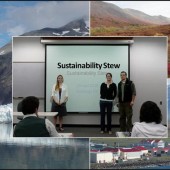
The concepts and practices surrounding sustainability are increasingly the focus of many new post-secondary and graduate education programs. However, the term sustainability refers to a complex mixture of disciplines, methods, contexts, and topics. This complexity is often confusing and can create barriers to learning. Comprehensive understanding of sustainability issues requires that students engage in an active learning process, focusing on context and perspective. Our “Sustainability Stew” curriculum, designed by doctoral students in various fields related to sustainability, is intended to guide sustainability education while offering the freedom to explore complex issues in an active, project-based learning environment. In this paper, we provide background and details for the design of the Sustainability Stew Guide and report results from student surveys on the curriculum itself from one undergraduate sociology course at the University of Alaska Fairbanks (n=37), one community college course at Delaware Technical and Community College (n=11), and one graduate-level research group at the University of Delaware (n=7). Student survey results and instructor reports suggest that the Sustainability Stew curriculum is an effective and innovative approach to sustainability education. Finally, we offer analysis and future directions for similar post-secondary sustainability education. Our objective is to offer a novel exercise to aid educators in teaching and discussing the concepts of sustainability in a way that encourages critical, multi-disciplinary engagement.
Continue Reading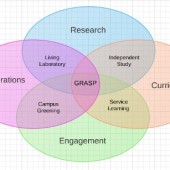
The current paper introduces and presents a preliminary pilot study of the Guided Research Applied Sustainability Project (GRASP) model for sustainability education. GRASP integrates curriculum, research, operations and engagement at the university level to create specialized projects that both engage students with real world issues and provide usable outputs for campus and/or community partners. Drawn from theory and practice in Education for Sustainable Development (ESD) as well as experiential education, the GRASP model includes five primary elements, which are the project topic (substantive issue being studied), groups (students working together), mentors (conduit between the instructional staff and enrolled students), assignment (pedagogical deliverable students submit for grade), and procedure (process of topic selection and project completion). GRASP was designed to enable implementation in both small and large courses at the undergraduate and/or graduate level and was tested in a large (200+ student) undergraduate Sustainability course. Projects included a campus sustainability audit and mixed methods analysis of documentary film campaigns. Survey data collected from students and mentors determined that the GRASP model is effective in providing students with a positive and engaging learning experience. Outcomes identified relate to attitudes and values as well as knowledge and skill attainment (e.g. teamwork, applied sustainability research). Suggestions include additional instruction on research methodology and greater clarification of project guidelines and mentor roles. The results of our pilot study reaffirm the potential impact of an experiential approach to sustainability education that incorporates multiple stakeholders from within the university campus and is scalable to large classes. GRASP is recommended as a model with which to meet these goals.
Continue Reading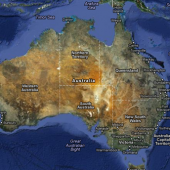
In this report from “down under,” Linda Zibell recounts the triumph of eco-centric language over a techno-centric approach to bringing sustainability into the Australian school curriculum. She brings deep insight into deconstructing the power of word choice and language patterns with real examples of how school-age kids might perceive and understand the words we use.
Continue Reading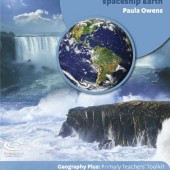
In this succinct and informative review, Shelby Gull Laird provides a good overview and solid recommendation for the comprehensive package of sustainability education K-12 curricular materials about geography—from a local to a global level—available from the UK Geography Association.
Continue Reading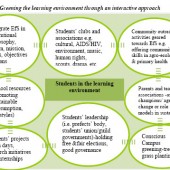
Embedding education for sustainability, in Faith Based Organisations’ (FBOs) school curricula in Uganda, puzzles. Any progressive education system should be dynamic-always calling for timely transformations in content, instructional methodologies, imparted values,
skills and attitudes, to remain holistic. Once these are adequately embraced, the system tends to remain vibrant and relevant to the institutions, the learner and the community. However, in Uganda especially in education institutions of FBOs, Education for
Sustainability (EfS) – a universally conceived aspect of holistic learning seems not to be whole-heartedly attended to either by omission or unawareness. Problems centre mainly on ideological and operational premises. These include lack of awareness, lack of goodwill of
key stakeholders to plan for and manage EfS and lack of competent teachers in EfS aspects. Answers to these problems in essence center on the theoretical underpinning of this report-curricular transformation. Secondly, proper capacity building, integrative planning,
financing and management to enable sustainable programme growth and development should also be enhanced.
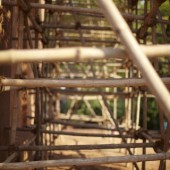
Nichols and Adams show how central design must be to sustainability by showing the numerous ways and multiple disciplinary perspectives that allow sustainability to be incorporated into the design curriculum. The program described goes far beyond a nod to “green building” technologies and shows how design is at the root of the ecological, economic, social and transformational aspects of sustainability.
Continue Reading
Mike Shriberg shows the power of implementing a true discussion-based curriculum in his sustainable campus course at the University of Michigan.
Continue ReadingEducation for sustainable development (ESD), a UN initiative, is an emerging field and a movement advocating for a reorientation of education. Integration of ESD has been slow, especially in higher education. The most notable progress is marked by campus greening and research initiatives, while pedagogical innovation, the topic of this paper, has been much slower […]
Continue Reading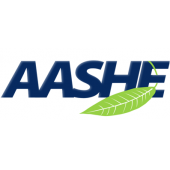
In this broad overview of where sustainability curricula in higher education currently stands and where it might go, Paul Rowland covers the bases of how the varied and diverse institutions of higher learning are integrating or incorporating sustainability ideas. He concludes that, while currently standing outside the status quo, sustainability proponents and their ideas are increasingly accepted and should, ultimately, hope to become part of the cultural norm. He compares this process to what has occurred with diversity studies and technology studies.
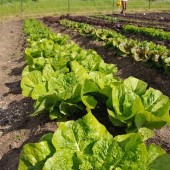
In an insightfully pragmatic way, John Gookin shows us how we can incorporate sustainability concepts into an innovative curriculum like that of NOLS without forcing the issue. He espouses the NOLS “organic” approach to curriculum design, where each taught element serves a real purpose, while finding great instances for including sustainability theory and practice.
Continue Reading